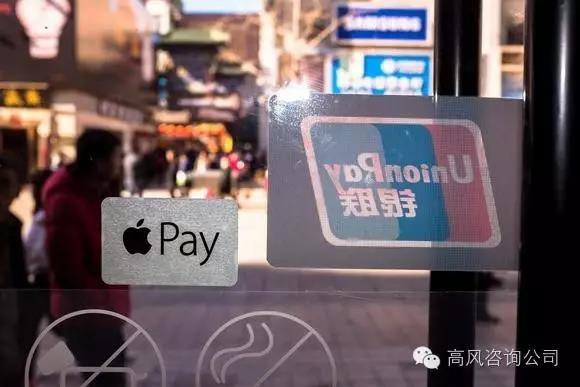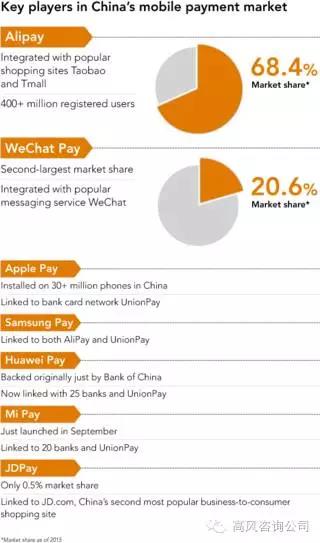
September 22, 2016 12:00 pm JST
Dr. Edward Tse, Ian Meller and Jackie Wang
Mobile payments have been embraced in China at a rate unseen anywhere else in the world, reaching approximately 16.3 trillion yuan ($2.5 trillion) in 2015. Whether it’s buying plane tickets or electronics or even paying utility bills, the Chinese consumer instinctively reaches for his or her smartphone. This is largely due to a consumer class that has leapfrogged the era of the personal computer and jumped directly into the smartphone age. China’s mobile payments industry has entered a new and exciting phase.
There have always been alternatives to the dominant Alipay and WeChat Pay sevices, but in the past year credible challengers have started to emerge. February saw the launch of Apple Pay, in partnership with state-owned payment processor China UnionPay. Samsung Pay arrived a month later. Viable alternatives backed by companies including Huawei Technologies, Xiaomi and LeEco are the latest to arrive.
Alipay, owned by Ant Financial Services Group, an affiliate of Alibaba Group Holding, remains the largest mobile payments player in China. It had a market share of 68% at the end of 2015 and has more than 400 million registered users, thanks to its links with Alibaba’s Taobao and Tmall shopping sites. WeChat Pay also has backing from parent Tencent Holdings that helps its reach. It is linked into WeChat, China’s largest instant messaging and social media platform.

Last year, WeChat Pay’s market share was 20%, making it a distant second to Alipay. But WeChat’s growing number of users and the increasing popularity of social media are helping it gain market share. This past Chinese New Year’s eve, some 8 billion “red packets,” gifts of cash traditionally exchanged at the holiday, were given through WeChat Pay.
The competition between Alipay and WeChat Pay has reached new heights as both are transforming into global e-wallets not only for Chinese domestically but also overseas. Both services have been building partnerships with foreign retailers and e-commerce platforms allowing customers to purchase products in yuan while abroad and on foreign websites. Travelers can also get tax refunds abroad through Alipay, which can save time at the airport.
NEW PLAYERS The emergence of Apple Pay in the China mobile payments market is significant, marking the arrival of the first legitimate foreign competitor to Alipay and WeChat Pay. For once, the two incumbents face a competitor whose ecosystem can rival their own.
Apple is one of the top smartphone companies in China, where it has been aggressively expanding. Yet before Apple Pay had even launched in China, analysts had discounted its ability to match the range of functions offered by Alipay and WeChat Pay and noted the lack in China of near-field communications, or NFC, terminals for contactless payment. When Apple revealed a partnership with UnionPay rather than Alipay, analysts again called it a mistake.
Within two days of Apple Pay’s launch in China, more than 30 million bank cards were connected to the service, implying linkage with one-third of the phones in the country then equipped to support NFC payment. By partnering with UnionPay, Apple gained access to China’s largest banks and thus a majority of China’s consumer class.
Before Apple Pay’s launch in China, Apple had already ensured that popular Chinese apps, such as those of food delivery service Meituan, e-commerce site JD.com and online travel agent Qunar, would support its payment service. Crucially, Apple Pay could soon be used on Tmall due to a new Chinese law requiring that e-commerce websites allow payments via competing systems, eliminating one of Alipay’s major competitive advantages.
PHONE MAKERS Apple isn’t the only one diving into China’s mobile payments market. Samsung Electronics, Huawei, Xiaomi and LeEco, the parent of Leshi Internet Information & Technology, are all making their own plays. Samsung followed Apple by partnering with UnionPay and getting the backing of China’s major banks for Samsung Pay, but Samsung has also integrated Alipay into its e-wallet.
When Huawei, now the largest smartphone company in China, originally announced its mobile payment service in March, it had the backing only of Bank of China(BOC). But by the time it launched in August, Huawei had added another 24 banks. In addition, its latest flagship smartphone, the Huawei P9, allows users to directly activate HuaweiPay through a fingerprint scanner on the back of the phone, even when the keypad is locked.
Other Chinese companies are in various states of building their own mobile payment systems. Xiaomi, one of China’s highest valued startups and the creator of the popular Mi series of smartphones, launched Mi Pay in early September. LeEco, which recently started offering mobile phones, has been building up its payment infrastructure by hiring a think-tank in Beijing to study internet finance and mobile payments.
For dedicated hardware providers like Xiaomi, Samsung, Apple and Huawei, mobile payments are another node of their ecosystems. The payment systems are features designed to increase the loyalty of consumers and help keep them hooked on the companies’ hardware.
Internet companies like Tencent and Alibaba are playing a much longer game, with mobile payments just a starting point for their bigger ambitions in internet finance.
Ant Financial has built an intricate and elaborate ecosystem that offers a variety of financial services and products to Chinese consumers including Sesame Credit, a credit scoring system based on Alipay payment histories, and policies from Zhong An Insurance. Alipay also offers loans to consumers based on online purchasing records on Tmall and Taobao. WeChat Pay users can also buy investment products.
The early success of Apple Pay in China and its ability to change the mobile payment behavior of the Chinese consumer is the largest threat that Tencent and Alibaba have yet faced on the mobile shopping front.
We are witnessing companies with different ecosystems clashing over the Chinese consumer’s wallet. This is an exciting and innovative period in China’s mobile payments sector. While Alibaba is the dominant player now, new entrants, both local and foreign, which are bringing their own service portfolios and a culture of innovation and disruption, are more than capable of challenging the status quo. It remains to be seen if these new players can ultimately unseat incumbents whose ambitions go far beyond simple mobile payments.
Dr. Edward Tse is founder and CEO of Gao Feng Advisory Co., a global strategy and management consulting company, and the author of “China’s Disruptors” (Portfolio, 2015).
Ian Meller and Jackie Wang are consultants at Gao Feng.

